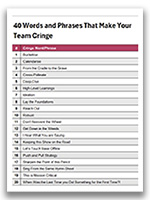Have you ever been in a meeting where somebody has casually used a word or a phrase that has just made you feel completely and utterly lost.
You are not alone, trust me!
Sometimes they make you feel slightly confused, sometimes you feel completely baffled and sometimes you just want to laugh out loud.
We asked our readers to share some examples of “management speak” with us and here’s what they came up with – ranging from the slightly strange to the truly bizarre.
The Worst Office Jargon Phrases Staff Love to Hate
Here are examples of management jargon that we love to hate, more than when somebody uses the word “organic” for anything else other than fruit and vegetables.
Along with these examples are some translations for those of you who are lucky enough to have never encountered these shockers in real-life conversation.

1. “Bucketise”
This is the act of putting things into “buckets” or, as a normal person would say, “groups”. The extra few syllables of saying “put things into groups” are well worth the extra effort.
2. “Calendarise”
If you calendarise something you schedule something. “Let’s put something in the calendar” is also an acceptable alternative.
3. “From the Cradle to the Grave”
This means from start to finish, which is much better to say, unless you are feeling particularly morbid.
4. “Cross-Pollinate”
Some scientists are now saying that human beings are not the same as bees. So, instead of “cross-pollinating”, try working with your colleagues and sharing ideas.
5. “Deep-Dive”
In the management sense this means to explore something extensively. It’s a nice way of saying “research something until you can take no more”.
6. “High-Level Learnings”
These are lessons that have been learned at the top level of your organisation. Instead of sharing them with you, this phrase is often used as the speaker doesn’t understand the lessons themselves and wants to skip onto their next point. We’re on to you!
7. “Ideation”
Simply another word for “thinking”. This a word typically used by an English student who gets over-excited by their thesaurus, wanting to impress their teacher.
8. “Lay the Foundations”
A round-about way of saying “prepare”. It is also cringeworthily referred to as “doing the groundwork”.
9. “Reach Out”
This is one that I have been guilty of using myself, but our reader Janette assures me that it “should only be said if you’re a member of the Four Tops”. As I am not, I will now use the phrase “go and speak to” instead.
10. “Robust”
When you could easily use simple alternatives like “strong” and “powerful”, you must start to wonder what’s going through someone’s mind when they use the word “robust”.
Management Jargon – The Cringey Sayings
From the slightly cringey to the much more cringey, here are further examples that are often used by a manager or team leader who may be a little too enthusiastic to share their wisdom.

11. “Don’t Reinvent the Wheel”
Don’t try to be innovative, just keep things simple. Advice does not get much more vague.
12. “Get Down in the Weeds”
This means to go into detail, to discuss the complexities of the issues. It’s quite a tricky one to understand how it originated – garden weeds are not the most complex plant. Sorry, garden weed fans!
13. “I Hear What You are Saying”
Everyone cringes when they hear this because the literal translation is: “I’m going to carry on with my point and ignore yours.”
Other personal favourites or “least-favourites” in this genre include:
- “Quite good” really means “not good at all”
- “I’ll keep it in mind” really means “I will never think about it again”
- “Let’s explore some other options” really means “your idea was not good”
14. “Keeping this Show on the Road”
This means to keep something going successfully, which isn’t too cringey until someone abbreviates it to KSOR in an email and you stare at it for five minutes to figure out what that actually means. The pessimists’ alternative is “keeping the boat afloat”.
15. “Let’s Touch Base Offline”
The more “jazzy” way of saying “let’s meet in person”, which you may want to think carefully about if you hear someone use this phrase.
16. “Push and Pull Strategy”
A push strategy is when you push a product towards a customer and a pull strategy is when you pull a customer towards a product. It’s a phrase that’s too often directed at us non-marketing muggles.
17. “Sharpen the Point of this Pencil”
Well done for not gagging when you read this one. It means to go further into detail about what your saying to leave a more “refined” mark on the listener – although it could be interpreted differently.
18. “Sing From the Same Hymn-Sheet”
This is another way of saying “let’s all work in unison”, unless your church is running out of lyric-sheets for its hymns.
19. “This is Mission Critical”
If something is mission critical it is very important to the success of the venture. I imagine sci-fi fans like to say this in a dramatic voice.
20. “When Was the Last Time you Did Something for the First Time?!”
The ultimate cliché, but at least a manager who says this cares about your personal development. I’m desperately looking for the positives now.
Management Speak – The Contact Centre Classics
Whether it’s a manager hoping to impress you with their expertise or a vendor going way too far in trying to dazzle you with their new technology, the contact centre is often a hub for terrible terminology.
Here are examples that I hope, for your sake, you cannot relate to.

21. “Adoption Process”
This is the practice of introducing a new process, procedure or technology onto the contact centre floor. Don’t worry, your manager isn’t asking you to prepare to raise a child from the workplace.
22. “Best of Breed / New Breed”
If a technology is best of breed, it is another way of saying it’s better than all of its competitors. New breed means that it’s better than what came before. But all of this talk of breeding over a Monday-morning coffee may be a little much.
23. “Holistic”
If you have a holistic view of something, you take a look at its entirety and not its components parts. The phrase “a holistic view of the customer journey” is a particular favourite of technology providers which leaves many of us scratching our heads.
24. “Leverage”
To leverage something means to make better use of it or bring it to the forefront of your operations. It’s something easy for a manager to say but difficult to figure out how to do.
25. “Low-Hanging Fruit”
While it may conjure the image of a discreet part of the male anatomy, in the contact centre it means to focus on the most easily achievable task.
26. “Operationalise”
This means to put something into operation. Another example of how adding “-ise” onto the end of an ordinary word can prove needlessly irritating.
27. “Onboarding”
The process of introducing new recruits to the contact centre. Seems harmless, yet many find that this phrase is only acceptable if your contact centre is situated on a boat.
28. “Seamless”
Can you feel your eyes rolling back into your skull when somebody says this? Phrases like “seamless transition” simply mean a “pain-free transition” or better still an “easy transition”.
29. “Team Diagnostic Survey”
A team survey looks to get to the bottom of a contact centre problem. It was a term devised by a manager who hadn’t got over a career failure in the medical world – probably.
30. “Vendor / Technology Agnostic”
If someone is agnostic it means that they believe that humans cannot know if there is or isn’t a god, right? So, how does this relate to technology? To be honest, your guess is as good as mine on this one.
For the definitions of other common contact centre words and phrases, read our article: Contact Centre Jargon and Terminologies
Slightly Strange Management Phrases
So, we’ve covered 30 really confusing words and phrases there. But let’s move onto the fun stuff, the whacky stuff that may make you question the speaker’s state of mind.
Here are examples sent in by our readers, who hopefully managed to suppress their laughter when hearing these in serious meetings.

31. “Can I Hitch Hike on the Back of that Comment”
Maybe you’ve heard “can I add to that point?” before, but this something else. Our reader Diane said that she was so speechless that her colleague had said this that he had the space to carry on speaking. So, who am I to question such a clever ploy?
32. “Decompose to a Lower Level of Granulation”
This must mean to look into something in more detail. But what level of granulation does it need to be decomposed to? One of life’s big questions.
33. “Let’s Circle the Wagons”
If you circle the wagons you “team-up” to defend against an impending attack. Apparently, this is a common phrase in the US, which is strange. But they are the country that brought us cheese in a spray can, so what can we expect?
34. “Run it up the Flagpole”
If you run something up the flagpole, you open an idea up to the room and test it by peoples’ reactions to it. Unfortunately, no flags are involved.
35. “Thought-Shower”
A complicated term for “brainstorming”. It has nothing to do with reflecting upon your life while in the shower, which I personally think is a much better definition.
The Truly Bizarre Management Phrases
It’s time for the fantastic five. The audacity of using these in everyday conversation, let alone in a business situation, simply requires admiration.
Here are five examples of bizarre management speak that our readers have genuinely heard in their workplace.

36. “Can I Sir Fry an Idea in Your Think Wok and See What Sizzles”
Incredible. I guess this means “let me share an idea with you and see if you like any part of it”, but at this stage it’s simply guesswork.
37. “Dynamic Symbiotic Engagement”
I think this one came straight out of Narnia. I won’t even attempt to “defend” this gobbledygook with an explanation.
38. “Give Them the Sizzle but Not the Sausage!”
Demonstrate how great something is, but don’t give it to them. I assume this is what the speaker meant and that they weren’t suggesting harmless flirtation.
39. “Strategic Staircase Workshop”
Oh dear. What have I just typed? According to a quick Google search, I think a “strategic staircase” is a plan for success. So the definition would be to do so in a workshop, possibly? Maybe. I think.
40. “Turning a Tanker With a Speedboat Gear Change”
I would imagine that this means to change course of action quickly. Where the speedboat came from, I don’t know, but there’s nothing wrong with a little whimsy.
Printable – 40 Words and Phrases that Make Your Team Cringe
Do you want to download this to share with your team?
Get your free download of 40 Words and Phrases that Make Your Team Cringe now:
Why is Choice of Language So Important?
As a manager, your words can have a powerful impact on your team – for better, or for worse – and using stale, non-sensical management speak can seriously undermine your authority.
Beyond cringe-worthy management phrases, did you know that your choice of words when asking your team to complete tasks can also make a big difference to how well they engage?
As explored by the below examples in this Harvard Business Review article on how to Find the Right Words to Inspire Your Team:
- Enable vs. Allow. If your effort produced a result, you actively enabled it. If you simply removed an obstacle, you merely allowed it.
- Respond vs. React. If a situation spurred you to action, you responded, but if the issue only triggered an emotion, you merely reacted.
- Accomplish vs. Meet (a Goal). If you accomplish a goal, you imply that you achieved that status as a direct result of your effort, but if you merely meet a goal, you’re only indicating that you technically hit the milestone — possibly by accident, circumstance, or gravity.”
Simple Rules to Remember
We’ve heard it all, from the random words that should have stayed in the thesaurus to the David Brent dictionary. We’ve even taken a look at some metaphors that Shakespeare would be proud of.
But if you’re going to take anything away from this article, make it the following three points that will help you to avoid confusing your team or even having them laugh in your face.
But if you’re going to take anything away from this article, make it the following three points that will help you to avoid confusing your team or even having them laugh in your face.
Avoid Words Ending in “ise”
Whenever you put “-ise” on the end of a word, you risk adding a layer of needless complexity to any given scenario, i.e. “operationalise”, “bucketise” and “calendarise”.
Don’t Abbreviate Unless it’s Really Obvious
KSOR and OOO abbreviations may be obvious to you, but that doesn’t mean that everyone else knows what they stand for.
Everyone Loves a Good Wok Example
44 of the phrases above may have had you cringing for all the wrong reasons, but I found the phrase “Can I stir fry an idea in your think wok and see what sizzles?” glorious. That one might win you a fun laugh in your next meeting.
Keep these three points in mind and good luck with eradicating each of these 45 phrases (minus the wok example) from your vocabulary. I hope your team find you much more “real” and “approachable” when you do!
For more articles relating to language and the contact centre, why not read the following?:
- Positive Customer Service Language for Positive Conversations
- How to Handle Emojis in Customer Service
- Top 25 Positive Words, Phrases and Empathy Statements
Author: Jonty Pearce
Reviewed by: Robyn Coppell
Published On: 27th May 2019 - Last modified: 7th Feb 2025
Read more about - Call Centre Management, Downloads, Language, Printable, Team Building, Team Management
















